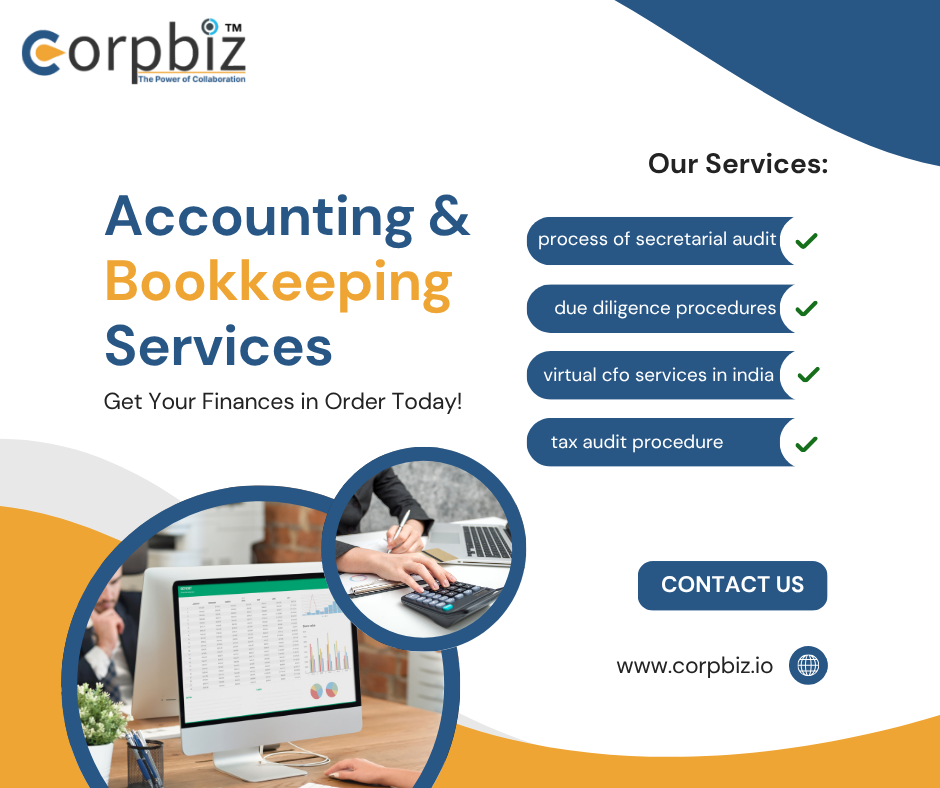Top Bookkeeping and Accounting Practices to Keep Your Business Compliant

Maintaining accurate and compliant bookkeeping and accounting practices is critical for the long-term success of any business. Whether you are running a startup or managing an established company, staying on top of your financial records ensures you meet legal obligations, optimize financial health, and prepare for growth opportunities. This article explores essential bookkeeping and accounting best practices and highlights how professional services like secretarial audit, due diligence, virtual CFO for small businesses, and CFO consulting companies can add tremendous value.
Why Compliance in Bookkeeping and Accounting Matters
Non-compliance with financial regulations can lead to severe penalties, loss of reputation, and operational disruptions. Governments worldwide have stringent laws requiring businesses to maintain transparent and accurate financial records. Compliance not only protects your business from legal troubles but also builds trust with investors, creditors, and stakeholders.
Effective bookkeeping is the foundation of compliance. It involves recording all financial transactions systematically and consistently, which helps produce accurate financial statements. Proper accounting transforms these records into actionable insights, guiding business decisions.
Key Bookkeeping Practices for Compliance
Maintain a Chart of Accounts
Organize your financial transactions into categories such as assets, liabilities, income, and expenses. A well-structured chart of accounts ensures consistency and simplifies financial reporting.
Record Transactions Promptly
Delays in recording financial data can cause errors and missed deadlines. Use accounting software or maintain manual logs daily to capture all income, expenses, invoices, and payments.
Reconcile Bank Statements Regularly
Reconciliation compares your internal records with bank statements to identify discrepancies. This practice helps detect fraud, errors, or unauthorized transactions early.
Keep Accurate Payroll Records
Payroll involves legal requirements like tax withholdings and employee benefits. Ensure timely processing and documentation to comply with labor laws and tax regulations.
Maintain Supporting Documentation
Retain receipts, invoices, contracts, and other proof of transactions. These documents are essential during audits or due diligence processes.
Essential Accounting Practices to Stay Compliant
Follow Generally Accepted Accounting Principles (GAAP)
Adhering to GAAP ensures your financial statements are consistent, comparable, and transparent. This makes it easier for external parties such as auditors and tax authorities to assess your business.
Prepare Financial Statements Regularly
Generate balance sheets, income statements, and cash flow statements monthly or quarterly. Regular reporting helps identify financial trends and compliance gaps promptly.
Conduct Internal Audits
Regular internal audits can spot accounting errors, fraudulent activities, and procedural inefficiencies. This proactive approach enhances compliance and risk management.
Implement Proper Tax Planning
Work with tax professionals to optimize tax obligations while ensuring full compliance with regulations. Timely tax filing avoids penalties and interest charges.
Leveraging Professional Services for Compliance
While many businesses handle bookkeeping and accounting internally, the growing complexity of financial regulations often requires expert assistance. Here’s where specialized services come into play:
Secretarial Audit
A secretarial audit is a thorough review of a company’s compliance with statutory and regulatory requirements. This includes verifying adherence to corporate governance norms, filing of necessary documents, and regulatory approvals. Secretarial audits help identify areas where your bookkeeping or compliance processes may be lacking, enabling corrective action before problems arise.
Due Diligence
Due diligence is a comprehensive appraisal of a business’s financial and legal standing, often conducted before mergers, acquisitions, or significant investments. It ensures all financial records, including bookkeeping entries and accounting reports, are accurate and truthful. Maintaining impeccable financial records facilitates smooth due diligence, enhancing your business’s credibility with potential partners or investors.
Virtual CFO for Small Business
Small businesses may not always afford a full-time Chief Financial Officer (CFO), but the strategic financial guidance of a CFO is invaluable. virtual cfo small business service provide expert financial oversight remotely, helping small businesses with budgeting, forecasting, compliance, and reporting. A virtual CFO ensures bookkeeping and accounting align with business goals and regulatory standards without the overhead costs of a full-time executive.
CFO Consulting Companies
For businesses seeking specialized financial advice, CFO consulting companies offer tailored solutions ranging from financial strategy to risk management. These firms bring deep expertise and experience across industries, ensuring that your bookkeeping and accounting functions support regulatory compliance and strategic growth. Collaborating with CFO consultants helps business owners focus on operations while staying confident about financial governance.
Tips to Enhance Your Bookkeeping and Accounting Compliance
Use Reliable Accounting Software: Modern tools automate many bookkeeping tasks, reduce errors, and simplify audit trails. Choose software that supports regulatory requirements in your jurisdiction.
Train Your Team: Regular training on accounting standards and compliance requirements reduces mistakes and keeps everyone updated on evolving regulations.
Stay Updated on Legal Changes: Tax laws, corporate regulations, and reporting standards frequently change. Subscribe to industry updates or consult experts regularly.
Separate Personal and Business Finances: Mixing finances complicates bookkeeping and raises red flags during audits.
Schedule Regular Reviews: Periodic reviews by internal or external professionals help maintain compliance and improve financial management.
Conclusion
Keeping your business compliant through robust bookkeeping and accounting practices is not just about avoiding penalties—it’s about building a solid financial foundation for sustainable growth. Incorporating secretarial audits and due diligence reviews, along with leveraging virtual CFO services and CFO consulting companies, empowers businesses to maintain transparency, accuracy, and strategic insight. Whether you’re a small business or a growing enterprise, adopting these best practices will safeguard your business and unlock new opportunities.
Note: IndiBlogHub features both user-submitted and editorial content. We do not verify third-party contributions. Read our Disclaimer and Privacy Policyfor details.







